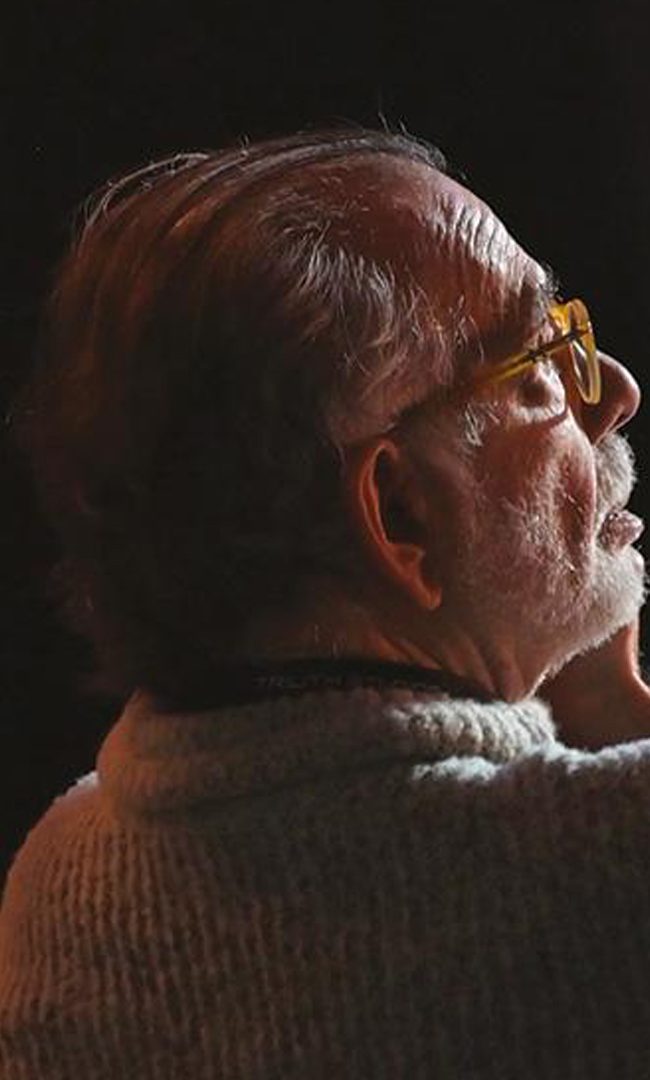A Conversation with Dag Johan Haugerud (Oslo Stories Trilogy)
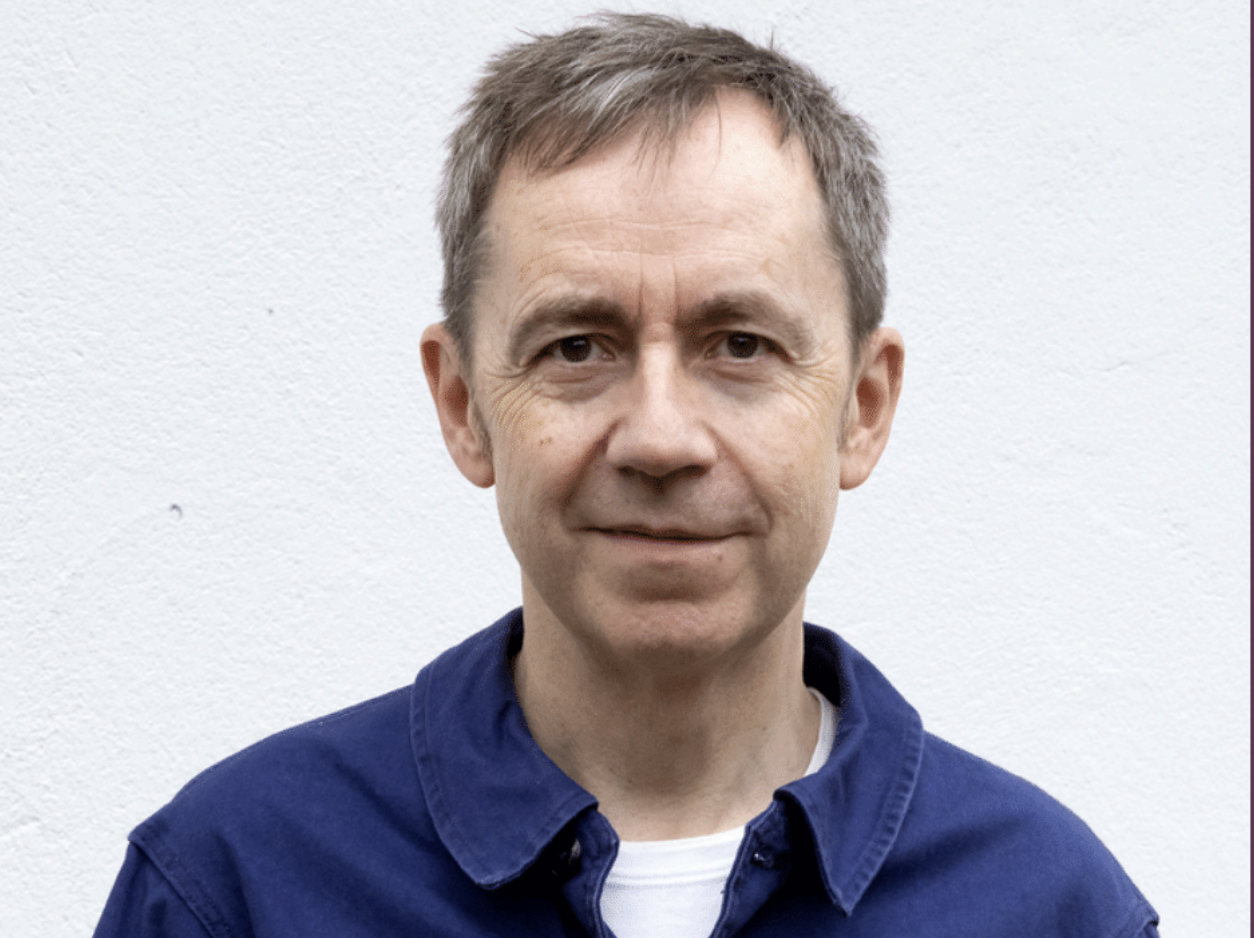
Norwegian filmmaker Dag Johan Haugerud is one of his country’s most influential directors and writers, having won numerous Amanda Awards and international recognition for films like I Belong and Beware of Children. His latest achievement is an ambitious trilogy examining sexuality, relationships, and desire across three interconnected films: Sex, Love, and Dreams.
Sex follows two men in heterosexual marriages who have unexpected experiences that challenge their understanding of sexuality and gender roles. One has a sexual encounter with another man without considering it homosexuality or infidelity, while the other experiences nocturnal dreams where he is seen as a woman, questioning how much personality is shaped by others’ perceptions.
Love centers on Marianne, a pragmatic doctor, and Tor, a compassionate nurse, both avoiding conventional relationships. After a chance encounter on a ferry, they explore whether casual intimacy could work for them, defying societal norms about how relationships should function.
Dreams completes the trilogy by focusing on 16-year-old Johanne, who falls in love with her teacher and documents her feelings in writing. When her mother and grandmother discover her intimate writings, they debate whether to publish them, leading all three women to confront their differing views on love, sexuality, and self-discovery.
The trilogy has garnered significant international attention, with Sex premiering at Berlin’s Panorama section and winning the Europa Cinemas Label and Prize of the Ecumenical Jury, Love competing at Venice International Film Festival, and Dreams premiering in competition at the 2025 Berlin International Film Festival. The following conversation was edited for length and clarity.
Hammer to Nail: When the family considers publishing Joanne’s intimate writings, you explore how personal experiences become commodified. What really concerns you about that process?
Dag Johan Haugerud: A lot of things, different things, really. It’s a matter of if she’s ready to publish her own life and also if that’s the right thing to do. I think that you see your life as a story. If something happens to you that you write as if it is a story, that doesn’t necessarily mean that you have to publish it or share it for everyone. Because writing can be a process that is good for you personally, privately, and to write to publish is something else.
But now there is a kind of trend where many people use their own life as the means for writing novels. The interesting thing is what is actually true, because the minute you start to write, you are going into some kind of editing process. You pick out certain parts of your life, of your personality that you want to highlight. Life is normally very chaotic for most people. So when you try to narrow it down into a story, you miss something of the chaotic life that doesn’t really fit together.
For the family, the mother thinks it’s the right thing to do to commercialize it, to see it as some kind of resource, the ability to write. And if you have experienced something interesting, you should use it. I think that the grandmother thinks so too, but she’s more concerned about the art, and she’s probably also a bit jealous. So it’s different motives that drive her.
HTN: At the 55-minute mark in Dreams, we have this sequence in the woods between the mom and the grandmother. I love lines like “it made me remember the tenderness I could experience for someone I so miss that. I thought of all those wonderful warm bodies that are no longer part of my life.” And then later the mom says, “it would not be any less her life if she published it.” Can you talk about what was important to you in depicting that sequence?
DJH: I think that when you are reading something that is really impressive or that touches you, you think about your own life. As the grandmother says, she remembers her own life and that makes her also long back. It’s a concern about taking care of the youth, our children, our teenagers, but part of that is also because we still want to be like them.
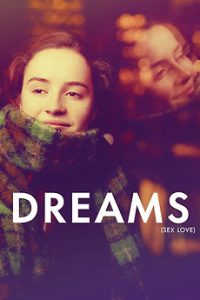
The second part about “it’s not less your life, even if you write about it” – that’s true. But I think the minute you start editing, the truth becomes something a bit narrowed down. I think that writing can be very limiting to your life. I think that you should try to experience it in the moment. That sounds like a cliche, but I really think so. You should also trust the capability to keep something in your memory, to keep it inside yourself. I think that’s something that we are about to lose in a way.
HTN: You cast Ella Øverbye, who debuted in your Beware of Children. How has she grown as a performer and what did her evolution bring to this role?
DJH: She has become more of what she was, I would say, because she was very intuitive and very participating, very unafraid as a child actress. She had a lot of suggestions concerning the script, what she was supposed to say. And she was not afraid of me at all. We had a very nice collaboration and we had the same humor, and that helps. Of course, if you meet a child that meets you in humor, that makes it all easier.
She has just become more of the same. But I used part of my memory of how she was in creating the character of Johanna. She had gone through teenage years, which is always confusing, but she found her way back to herself and the acting during this process.
I wrote it with her in mind. I thought about her the whole time. I knew how she talks. She talks very fast. She uses a lot of words that are common for teenagers, she uses “like” all the time, very much so. But she also has some grown-up phrases that she uses. I tried to incorporate all these in the script. She has a certain temperament as all people do, so it has to be incorporated. You don’t lose that even if you’re acting; you take your personality into the acting.
HTN: Your cinematographer, Cecilie Semec, has shot all three of these trilogy films. How did you develop a visual language that is consistent among these three films while remaining specific to each project?
DJH: There were a lot of preparing and testing of lenses, different cameras and also locations to try to give them some kind of look that would enhance the script and also make them separate because we didn’t want to have a situation where the audience, when they come in to see the next film, it looks very much like the last one. We want to try to create different worlds or universes for each film.
We did a lot of testing with framing and movement as well. Both me and Cecilia really like more objective takes on filmmaking – we want to be a bit away from the action. But this one, we thought it has to be very subjective. Everything is told from the girl’s mind. And then we had to go a bit closer, closer than I am comfortable with, I must say. But in the end, that’s what we chose. It was very detailed work, really.
We had to test the different faces in the different lenses to see which would fit the different actors.
HTN: Why did you go with a different composer for Dreams as opposed to Sex and Love?
DJH: Initially Anna Berg was going to make the soundtrack for Love because she’s acting in Love. She’s acting as the composer in Love. So I thought it would be a good idea when she’s a composer playing herself, she should also have the opportunity to make the music. But then it didn’t turn out like that because, for several reasons, she did not have the time to do it.
Then Peder Kjellsby had already started to compose a score that we really liked. So then we asked her to do Dreams instead. I think that was a happy choice. But Peder also wrote some music in Dreams. The part where she is walking through this district in Oslo, where a lot of immigrants are living and up to Johanna’s place, that’s Peder Kjellsby’s music.
HTN: I was going to ask about that moment. I love when she says “I would either be saved and everything would be fine or my life would end” and then she goes up the stairs.” We have this incredible long shot of the staircase and the music is totally chill-inducing. This leads right into the jump a full year ahead. At what point in the screenwriting process did that moment come to you and what was important in depicting it?
DJH: I think that when you are basing the dialogue and the script on voiceover, that gives you so much liberty to create different time levels. So I wanted to do that because in the monologue, almost all the film she’s thinking back and forth and you never really know what is the “now” moment in the film. And also in order to try to separate the different parts of the film or make chapters, that also could be useful because when you are getting back or you are jumping ahead and then you’re getting back again, then you are on a new engine in a way. So that helps for the editing. I must say that the editing process was very easy in this film, probably because of how it was written. The engine runs in the voiceover.
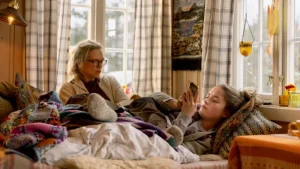
A still from DREAMS
HTN: At around the 12-minute mark in Dreams, we have this wonderful moment where she wakes up from the dream of them in the cabin staring at each other naked. What fascinates me is her reaction to the dream where she says she felt warm and weird like a fever and that she felt awful. Why would this dream cause that reaction out of her?
DJH: Because she’s only 16 and she’s having a sexual dream. That can be quite confusing and also shameful in a way. I don’t know if everybody would react like that. But I think that if you are feeling the grown-ups look at you… I’m quite interested in this because when is the moment in life that you are sensing that you are a sexual being? What does that do to you? Does that cause shame? Or does it cause confusion? Or does it make you feel happy? But I think there is definitely confusion.
HTN: The conversation at the cafe between Joanne and the mother, I think is just so riveting. I love when she talks about how she felt abused by the depictions of her body and the mother jumps to her defense. Can you talk about crafting this moment?
DJH: That’s the first time we really hear Johanna talk. I thought it would be good to make her as common as possible, not necessarily very nice. To defend herself and calling the other party the abuser is quite a common thing that abusers do – they put the blame on the other side.
I wouldn’t call it abuse, but I think that something has happened. Even if it hasn’t happened concretely, physically, it has happened in her mind. That is also the question of the film – what is real? Can something happen if you are only imagining it, if you are thinking it, or does it have to be a physical thing that has happened? If you are having sexual thoughts about someone, you might feel guilty when people ask you whether anything actually happened between you. Even if it’s only happening in your imagination, that can still bring shame or guilt. So that was the meaning of the scene, to make it even more nuanced and make the audience and myself uncertain of what has actually happened.
HTN: Looking at Sex, I love this line where the doctor tells the CEO about having sex during the third trimester of pregnancy and says “amazing all the people your body can and has to accommodate.” I’ve been seeing generally a lot of people musing about how these movies are anti-monogamy. I personally see it more as a study of how we’re all too endless to stay bottled up within ourselves. Do you agree with that reading, or was the idea of being anti-monogamy on your mind?
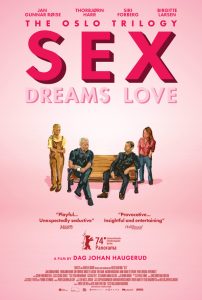
DJH: No, I’m not anti-anything really haha. People have to choose, but I think that you have to find a way of encompassing all your different feelings and longings. You can do that in a monogamous relationship as well. But I think that to admit that something is good, that you have certain longings, I think it’s quite liberating. When the doctor speaks about that sexual experience, it’s nothing to be afraid of. It is like it is.That’s probably the point of making this movie – to try to say that sexuality in whatever forms it comes is nothing to be either afraid of or shameful. It can be just a very positive experience. You should treat it like that, not treat it as something dangerous.
HTN: The three generations of women obviously each have different perspectives on love and sexuality. What changes do you see across these generational viewpoints? And what did you really want to highlight of their three generations?
DJH: You could probably see them as one woman, in that they are developing because your love life, your sexual life are developing throughout your life. And nothing can compare to the feeling of the first love when it’s so innocent, you don’t know what is coming. You’re totally innocent and you take it as it comes.
But later on, you get used to it. You get used to how other people react, and sometimes love and sexuality can be a real disappointment in life.You will have this throughout your life – you will have all these different experiences, some very positive, and some also very negative. At certain times in your life, I think you will get the feeling of being quite lonely, because all your different experiences have led you to this point that you have to reconsider what you really want, and what is good for you, like her mother does. In the end, when you’re quite old, you wish you could have another go, because you still have those needs, but you don’t necessarily have the same opportunities. You could probably see it as a development of a person’s sexual life or love life.
– Jack Schenker (@YUNGOCUPOTIS)









